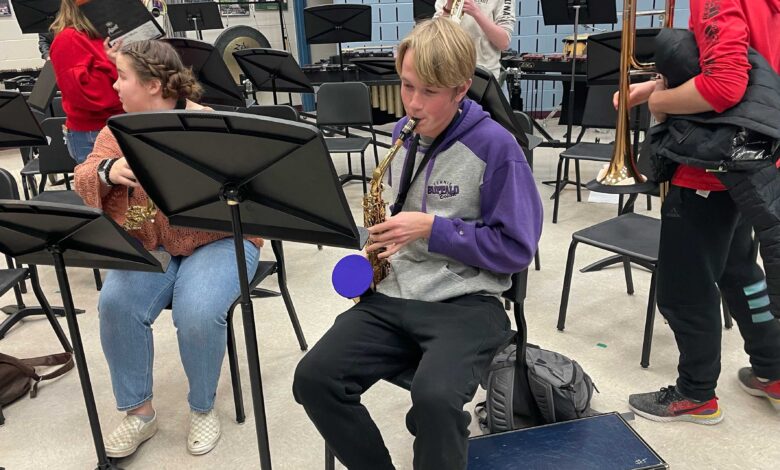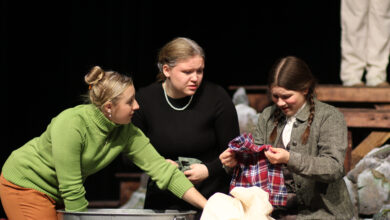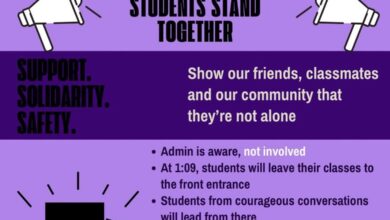Musically, Patrick Lubben Does It All
Interviews from Patrick Lubben, Scott Rabehl, and Zack Carlson.

At the age of three, Patrick Lubben received his first guitar.
“…It wasn’t much of an instrument,” Lubben remembered, “it was kind of a piece of wood with some strings on it. I didn’t know how to play it.”
He wouldn’t graduate to a real guitar until the age of nine, and by then he had already added a new instrument to his repertoire: the piano. Now, as a senior in high school, Lubben’s instrumental range expands as far as the alto saxophone. He now can play as many as five different instruments, (countless more if you include the wide range that percussionists learn), and sings in both the Concert Choir and BHS Singers. His other involvements include Jazz I and III, Concert band, musical theater, and the worship group at his church.
Described by his teachers as “fearless, kind, and respectful”, Lubben has become an integral part of the music department at Buffalo High School.
“[He has a] really diverse set of skills that is making a difference for all the students around him,” said band director Scott Rabehl. “I think the thing that really jumps to the front of my mind when I think about him though, is that he has turned into one of those kids that does whatever needs to be done when it needs to be done, without thinking about whether he wants to do it or not. He’s a terrific, terrific leader, a terrific mentor for students around him, and just someone that’s going to be almost irreplaceable around here when he graduates.”
PATRICK LUBBEN
Q: When did you start becoming interested in music?
A: “I’m lucky that my parents signed me up for music stuff since I was really little. All my sisters are older than me and they went through piano lessons. As soon as I was able to take them I was in the piano lesson rotation so I was probably around five.”
Q: Is it hard to make time to practice and participate?
A: “It’s not much of a chore [to practice], it’s more of a ‘I’m done with school’ [thing], and it’s never hard to go to bed thirty minutes later or wake up thirty minutes earlier if it means getting to practice something that needs to be done.”
Q: Do you see yourself doing anything musical, professionally or otherwise, in the future?
A: “I’m going to [the University of Wisconsin] Eau Claire for college and I’m going to be playing in their jazz ensembles, so I’m taking music past high school. I’m planning on minoring in guitar while I’m there, they’ve got a good program apparently, so that might mean that I might teach guitar lessons on the side, but music won’t be the center of my life. It won’t be what puts food on the table.”
Q: When did it really start to feel like you were a “musician”?
A: “Since I started kinda young, it’s always kind of had to be part of who I am, you know? When your parents pay for lessons you don’t want to let it go to waste, so it’s always kind of had to be part of who I am, but it wasn’t until I was probably in fourth or fifth grade that I really adopted it and wanted it to be who I am.”
Q: What is your ‘why’ as a musician? Why do you play and continue to play?
A: “Music is probably the best way to connect with people. I can’t speak for everybody but everybody likes music, so I think it’s to make connections.”
Q: Is there anything else you’d like to add?
“Another musical thing that I do is worship team at my church. I’ve been doing that since I was in sixth grade. I remember I’d always go to church and see how many people having fun on stage and wanting that to be me. This might not be interview material, but it was selfish at first because I just wanted to look cool, but then it also started to be one of the mediums where the work I’ve put in can have an output where it can bring people together and that also makes me like music more. It all kind of boils down to a love of music. It’s not like I love the guitar or the sounds a piano makes, it’s just like, I don’t know, it’s driving.”
SCOTT RABEHL
Q: If I asked you to describe him, how would you do so?
A: “First of all, he’s a fantastic musician. He’s a great singer, a really fine percussionist, and a terrific guitarist, and he’s made a real difference around here. As a freshman, he had all those skills, but I would say probably focus was a challenge for him, and just kind of being on top of things in the transition between middle school and high school and the number of activities and interests that he had was really challenging and daunting for someone to be as involved with as he was. Jazz became one of his favorite things for his high school music experience and he has learned to play drum set, guitar, and when we needed a bass player for Jazz I, he flipped from guitar to bass. He knew how to play it already, but learned to be really good [at it], so now he’s a bass player in Jazz I, and he picked up an alto sax[ophone] this year and is learning to play that in Jazz III.”
Q: What would you consider his most noteworthy qualities?
A: “Empathetic, caring, considerate, respectful of students who are his peers, [respectful of] students who are less experienced than him, and he’s respectful of the adults in his life. I just think that he’s a person of quality.”
Q: Considering his current trajectory, where do you think he could end up if he continued to involve himself in music as much as he does?
A: “It’s possible that he’ll end up studying music at the next level, that next level being college. I know he’s going to college and I know that he wants to have guitar study as part of his curriculum at the college level. I don’t know that he’s planning on being a music major, but the beautiful part about the guitar is that you can be a lifetime guitarist, whether you’re making a living off of it or not. I would foresee Patrick being a lifelong lover of music and a lifelong performer of music as a guitarist, either as an individual or in small groups that he can be involved in, not just in college, but forever.
Q: What could younger people learn from him?
A: “Be fearless. Being a musician or becoming a skilled musician requires that you not be afraid of failing. You have to fail a lot in order to get good at anything, and Patrick has been willing to experiment with things for his entire life. When you fail a lot, you learn to get good, you develop skills. Kids who are afraid of making mistakes never get good at anything.”
ZACK CARLSON
Q: How do you know him? How would you describe him?
A: “Patrick has been a choir student of mine since his ninth grade year and I’ve known him only through music, only through the realm of music, so that’s kind of the way I think of him when I hear you say Patrick Lubben’s name. I think ‘oh, music kid, awesome, hard worker, really flexible.’”
Q: How different is he now as opposed to when you first met him?
A: “I think he’s probably come out of his shell a little bit more. I think in ninth grade he was a little bit more quiet and now as a senior he’s certainly a little more not so reserved. I think he found his group of people, which is good.”
Q: What would you consider his most noteworthy qualities?
A: “Kind and respectful. Really open to any kind of musical ideas or trying anything different. For example, asking if he would be able to play this certain kind of thing on this date, [he’ll say] ‘oh, sure, I can figure that out.’ That kind of nature is really great.”
Q: Considering his current trajectory and how much he wants to be involved, where could you see him going in the future?
A: “I think he would be very successful as any kind of musician, like a working professional musician, because his skill set is so broad that he could be a gigging musician especially in any large city or place. I also think that he’d be really successful in any kind of music business, or, really successful in anything, because I know that the skills that he’s learned in music or through music are completely transferable to whatever industry he would desire to pursue.”
Q: Anything else you’d like to add?
A: “He’s awesome.”





